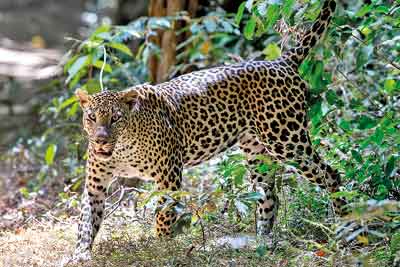WNPS lecture: Leopards under the spotlight
View(s): The Wildlife and Nature Protection Society’s monthly lecture – will be delivered by its President Rukshan Jayewardene on January 18 at 6 p.m. at the Cinema Hall, BMICH, Colombo 7. The lecture is open to all members and non-members, admission free.
The Wildlife and Nature Protection Society’s monthly lecture – will be delivered by its President Rukshan Jayewardene on January 18 at 6 p.m. at the Cinema Hall, BMICH, Colombo 7. The lecture is open to all members and non-members, admission free.
The lecture will be on ‘Social life and survival strategies of the Sri Lankan Leopards’. Leopards are mammalian carnivores at the apex of the food chain in this island. They not only feed on large herbivores like sambhur and buffaloes but also on dozens of other species both large and small including reptiles and amphibians.
Highly adaptable and versatile in both diet and habitat preference, leopards live in marginal areas where other large cats have been long extirpated from. The leopards’ adaptive radiation throughout Asia and Africa is one of the great success stories of Mammalian evolution.
Primarily leopards have realized that humans are best avoided as they pose an ever-present danger. However they are able to live in close proximity to human settlements even in urban areas and live on livestock, pets and suitable refuse especially when humans have depleted their natural prey base, by habitat destruction and hunting.

Rukshan Jayewardene
Human leopard conflict however is a growing problem in some areas especially the hills. It is possible to avoid this conflict altogether thereby ensuring the long term survival of leopards if a few behaviour changes are undertaken by us. Leopards are an important part of the food chain and ecological balance in the landscape and are an important keystone species. Their extinction will have unforeseen, adverse consequences throughout the wilderness areas of the country, impacting directly on many other species.
A founding trustee at the Leopard Trust, founder member and chairman of the Wilderness and Protected Areas Foundation, Director at The Environmental Foundation Limited and President of the WNPS, Rukshan Jayawardene’s first job was at the National Zoological Gardens Department where he learned much about animals especially leopards and other big cats. Leopards were to become a lifelong obsession. He has an undergraduate degree in Anthropology from the University of Maryland at College Park and a post graduate degree ( MPhil.) in South Asian Archaeology from the University of Cambridge U.K.
He has a special interest in understanding evolutionary relationships between proto. humans, other primates and adaptive radiation of all species.


